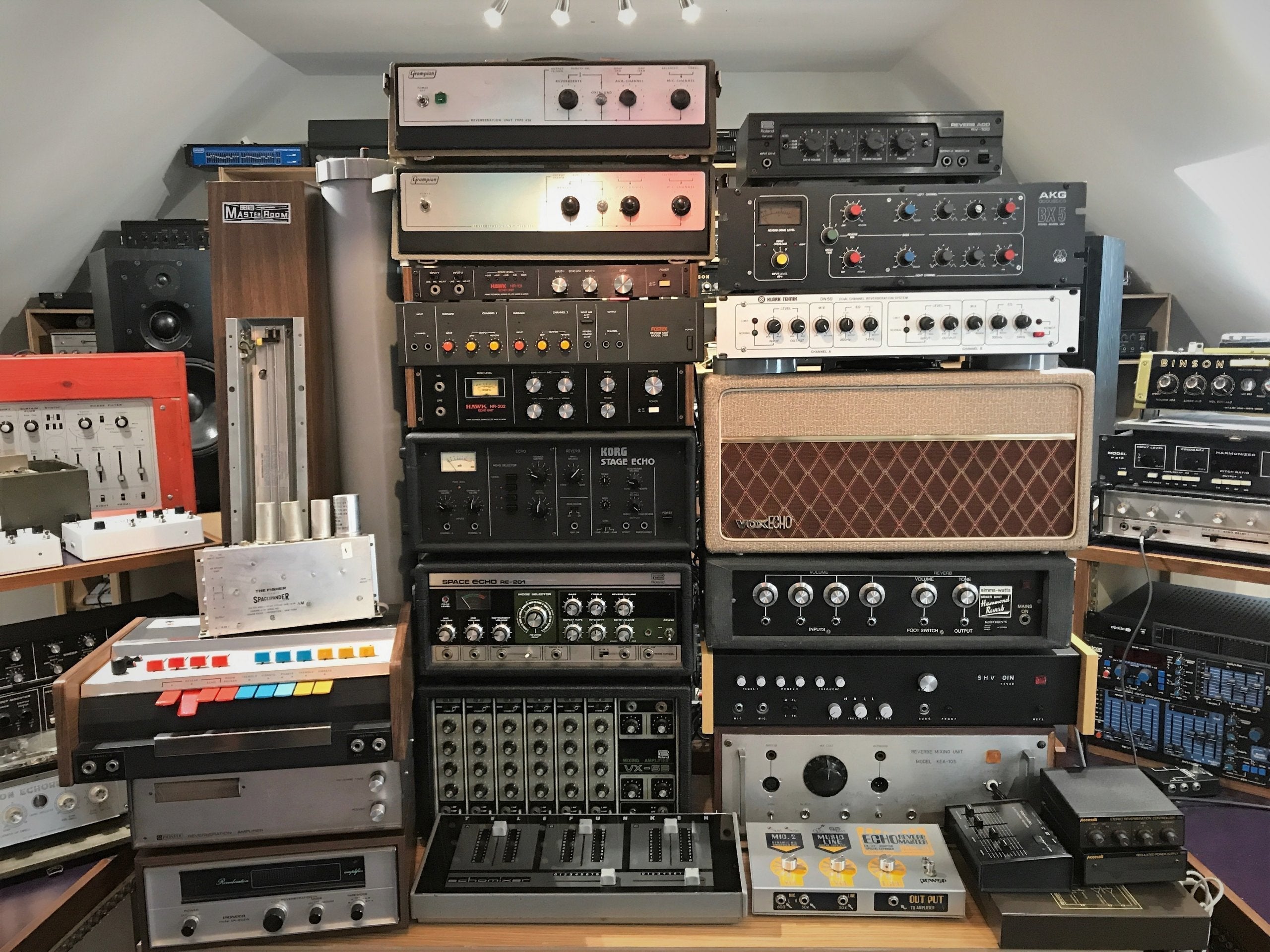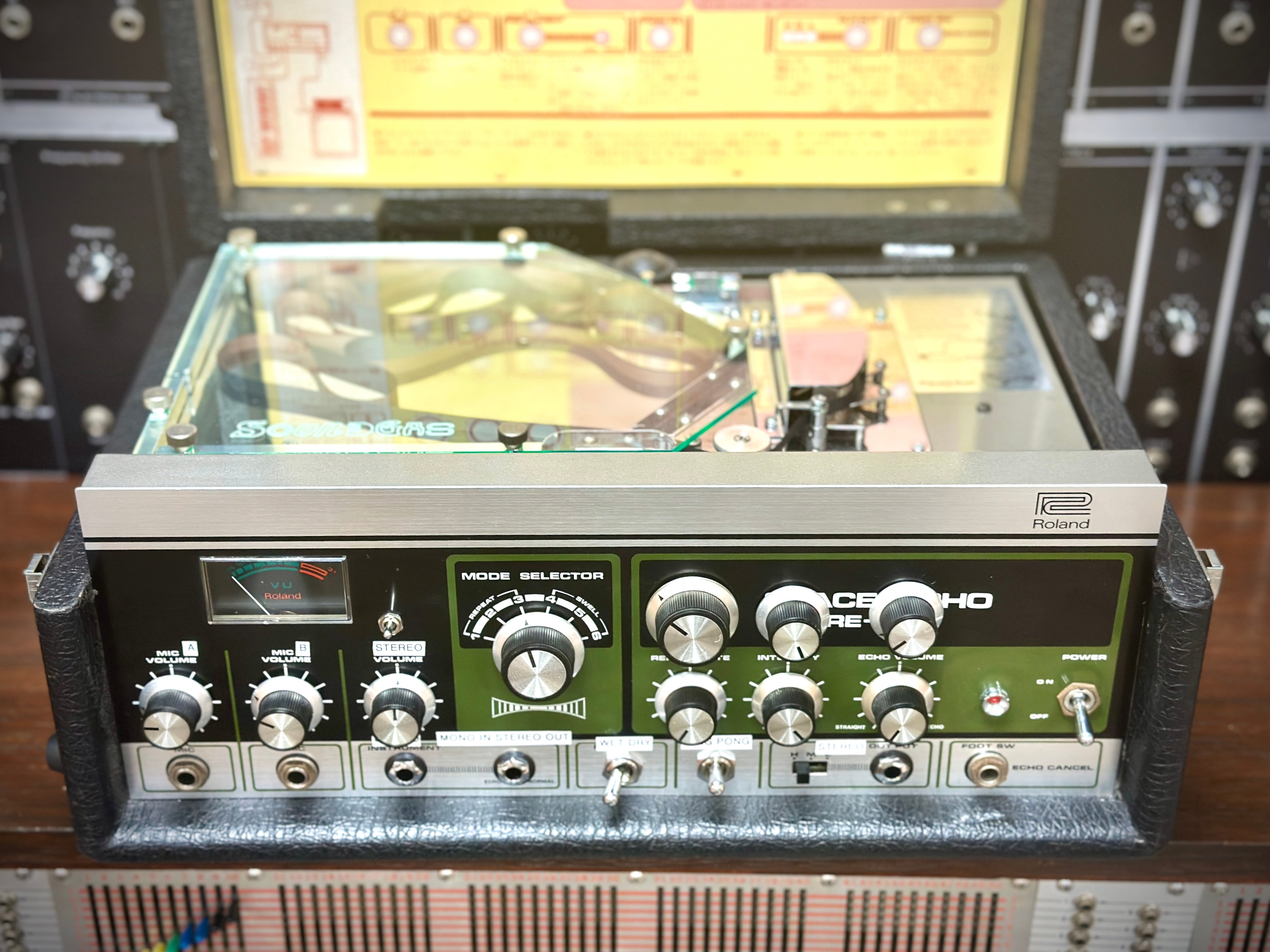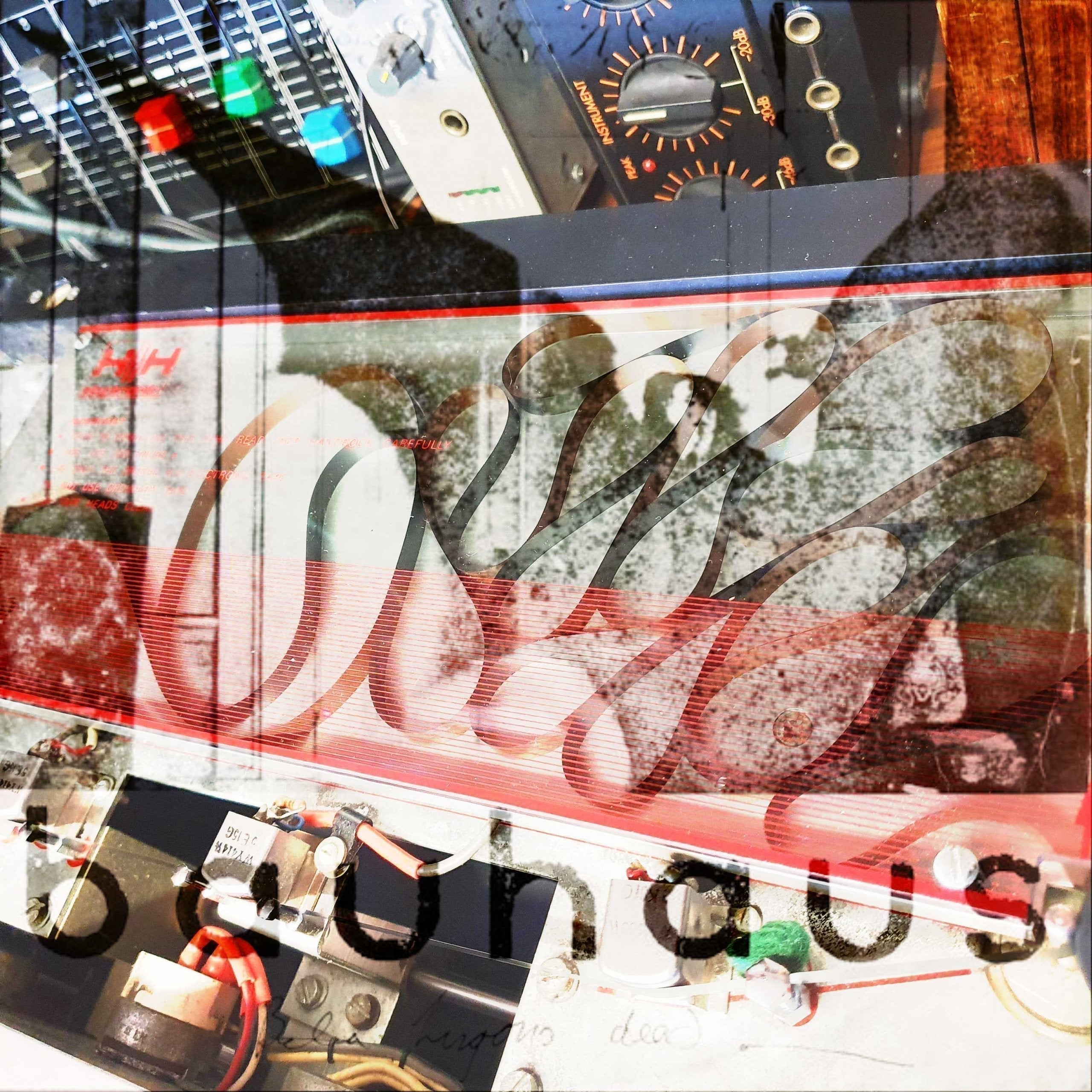
Echo Fix EF-X2 vs Space Echo RE-201
Our new vs old tape echo comparison video is now live: Echo Fix EF-X2 against a Soundgas Roland RE-201 Space Echo and RE-501 Chorus Echo. Watch and read about the process and our verdict on the strengths and weaknesses of each machine as once again we answer the question: “Which is the best tape echo for me?”
To make it a fair and meaningful comparison we selected machines that were serviced some time ago and that have seen regular use since, rather than freshly restored or higher priced exceptional/modified units. The two vintage machines are solid Soundgas Roland Echoes which, while sounding and performing better than most, are not exceptional/premium machines fresh out of the workshop.
If you want to dive straight in, below is the the first of our two longer comparison videos on YouTube. However if you read on you’ll find several short excerpts covering some of the main features that were posted to Instagram (coming soon).
And if that’s whetted your appetite and you can’t wait, here’s the links to view/order your new tape echo:
CAN A NEW ECHO BE… GOOD?
Echo Fix in Australia have been making replacement parts for Roland Space Echoes for many years. When they announced they were introducing a brand new tape echo, the EF-X2, I was intrigued, but with some reservations.
Over the past quarter century there have been a handful of new mechanical echoes launched with great fanfare, but most have fallen very short of delivering on the initial excitement/hype. Some promised much and were initially ok, but few (in truth only one – the Fulltone TTE) were well enough designed and manufactured to stay the course. Some were hideous to service/calibrate (Blue Coconut Unity anyone?), others though sonically ‘interesting’ really did not deliver the quality that most of us expect from a tape echo (T-Rex Replicator, I’m looking at you – yes, gnarly and a lot of fun but with repeats that resemble a dictaphone recording).
So while I was hopeful, given Echo Fix’s history of manufacturing parts and knowledge of Roland machines, it was with these reservations in mind that I ordered one of the first units. When it arrived there was much to admire – the build quality was good – but we felt it fell short in some areas compared to its vintage forebears and that machine did not earn a permanent place in my echo collection. In fairness to the EF-X2 working at Soundgas, in addition to my mere dozen or more mechanical echoes, I have access to a rolling selection of the best vintage machines you could wish for.
I remember discussing this with Nils Frahm who told me that he’d been exploring possible tweaks and improvements with Echo Fix and that we should watch out for the next iteration. Fast forward a couple of years and we were approached by the UK distributor asking what we thought about the EF-X2 and if we’d like to try a new one to which I replied of course!
The new machine incorporates a fair few improvements over the first one – a real spring reverb as well as the original’s DSP reverb (to which has been added chorus) and an Echoplex EP3 style preamp suited to guitar – so we were keen to revisit and reassess it against our vintage Rolands.
I began A/Bing the EF-X2 against a Soundgas Roland RE-201 Space Echo. To make it a fair comparison that would be meaningful to most people, I used a machine we’d serviced some time ago and that has seen regular use since, rather than a freshly restored machine. It’s a solid Soundgas Space Echo, which sounds and performs better than most other vintage units, but is not one of our exceptional/premium machines fresh out of the workshop.
Below is one of the A/B/C test videos from instagram – decide which you like best and then read other people’s answers on the post here.
The first thing that struck me is the higher (tape) noise floor on the EF-X2 compared to the 201. It’s not terrible but it was enough for me to pause testing and ask the distributor for a second EF-X2 to be sent to be certain there wasn’t an issue with the first one we’d received. The second was exactly the same, so testing proceeded. I don’t know if this is down to the modern heads – but it seems modern manufacturing does not produce heads to the same standard as in bygone times (we’ve learned from Binson Echorec restorations that the performance of original sixties heads eclipses that of those in later units and exceeds significantly the results from new replacements). It could be down to the circuit design, but without a deep dive inside – which is not within our remit here – we cannot say for certain. It’s not terrible, and I doubt anyone would notice if they were not A/Bing against the Roland machines. You can hear and judge for yourself in the demos.
Following initial testing I decided to include an RE-501 Chorus Echo as well: the EF-X2 is closer in sound to the later Roland than the 201, which dates from 1973. While I was A/B testing the three machines in my studio, Dec and Joel were running the second demo unit and reporting back on their findings. This was essential as Joel – as the main echo tester at Soundgas – has more than likely played through and listened deeply to more Space Echoes than almost anyone else on the planet. Incidentally, that second unit arrived with some initial motor instability/warble which eventually cleared with use – something to be aware of with mechanical devices is to test and run thoroughly post delivery before reporting as faulty (we had one buyer insist on returning his RE-201 because it didn’t echo – he refused to carry out any fault-finding/troubleshooting before he sent it back – the ‘fault’ was the echo switch was turned to ‘off’).
Rather than write in great detail about the individual sounds/machines, I would urge you (if interested) to watch/listen to the demo videos and judge for yourself, but suffice to say it was a very revealing experiment! I will note the main differences and some conclusions below.
Here’s another test, this time with vocals:
The EF-X2 repeats have a much greater frequency range than the 201 – and to a lesser extent the 501 – which can sound very good with guitar, vocals, piano etc. The EF-X2 certainly performs as one would hope of a high quality modern tape echo in this respect: sometimes I felt almost to the point of being too clean and clear for my taste (but I write this as a self-confessed vintage gear/echo nerd who delights in noisier and cranky/characterful equipment/sounds).
Hainbach has one of our Space Echoes and an EF-X2 and he loves how crisp and clear the EF-X2 compared to the 201 is: “Mine is whisper quiet… everyone comments on how clean the Echofix is… the spring reverb and grit of the preamp are nicer on the RE but with the Echofix with SOS mods I can do subtle things.”
WHICH MACHINE IS RIGHT FOR ME – A VINTAGE ROLAND SPACE ECHO OR ECHO FIX EF-X2?
This very much depends on your taste, requirements and attitude to your gear. If you are buying a tape echo for character – certainly if you are a dub-influenced musician like me – then it is no-contest: the RE series get you that sound – there is something about the limitations of the older machines that just works musically. The EF-X2 is so clean (aside from a little tape noise) it’s almost pedal-like, and its extended frequency response, combined with the sound of the circuitry means that I very much prefer the sound of the repeats and self-oscillations of the Rolands. Here’s the oscillation comparison video:
If I want clean repeats, I use a digital delay (vintage or perhaps analogue emulation). But, if you seek that extra something, that tape magic, but do not want to risk going down the vintage route – so for gigging especially (people do gig our Space Echoes but they have techs and a back up plan) – and you want cleaner tones, then the EF-X2 is going to be the answer.
Did you say tone? I see guitarists’ ears pricking up at mention of the word – some players are using the EF-X2 live and reporting favourably (Neil Finn with Fleetwood Mac, no less) – and this of course very much depends on what sort of tone floats your boat. If you seek a cleaner, full frequency sound with less degradation of repeats (slightly at odds with a primary reason people choose analogue/tape delays), then it’s the EF-X2. If you are more rooted in the sounds of classic recordings, then the vintage units get you there – and if you go for one of our RE-201s modded with the early preamps even more so.
Guitar is not my primary instrument (some might suggest I shouldn’t be allowed to pick one up): I felt the sound of the EF-X2’s EP style input wasn’t as engaging as an early preamp 201, but then I’m not a subscriber to the widely held belief that the EP3 preamp works a particular magic. I sold my EP3 back when Dr Huw first serviced an EP-2 for us (I’d had several shockers over the years – some supposedly serviced by Echoplex ‘experts’ – none of which had sounded or functioned anything like the one I still use). For me a good EP-2 is streets ahead tonally of an EP-3, but as I said, I am perhaps not a typical guitar person. That said, after an initial ‘meh’ I spent an hour happily noodling away with the EF-X2 and found it to be very pleasing and engaging indeed: exactly what I seek from a good tape delay – to be lost in a world of swirling echoes.
When asked by customers to advise them on ‘which space echo should I choose – a 201 or 501?’ I always used to answer by asking if they wanted to sound like David Gilmour from The Wall era Pink Floyd to select a 501, or if they preferred the sound of the early seventies, a 201 (this was a simple way of illustrating the tonal differences between the Rolands rather than historical accuracy: early Floyd was Binson Echorec all the way until David employed an MXR Digital Delay for The Wall). I might suggest that if you want to be Nils Frahm you might choose the EF-X2, but he still uses his beloved (and multitudinous) RE-501s it seems but the EF-X2 does ‘improve’ on the final Roland from a purely technical aspect.
I expected to hate the DSP based chorus and mildly dislike the reverb over the real spring but with guitar and in conjunction with the tape echoes, I found it all to work very well. Lots of happy moments and enjoyable soundscapes occurred. As a one stop shop for a musician who does not already possess far too many echoes (note earlier I described owning a ‘mere’ dozen or so tape echoes), the EF-X2 could win over many new converts. Will they later progress – or should that be regress? – to a vintage machine or will those who start with the EF-X2, regard the earlier Rolands as technically inferior in the same way as perhaps as the designers of the Echo Fix machine do? Roland’s designers ‘improved’ on the RE-201 and 301 to make the 501 quieter, and removed ‘flaws’ such as the wonderful runaway self-oscillations (set a 501 up according to factory spec and it will not self-oscillate: naturally we do not set our machines up thus).
LIMITATIONS AND… SURPRISES
The EF-X2 robs me of one of my favourite ‘tricks’ – switching between the head patterns mid-echo to create wild rhythmic stutters which can get truly crazy at higher feedback settings – the ‘improved’ silent switching of the EF-X2 means this is lost. Just at the point I was prepared to declare that the Echo Fix machine is absolutely not the one to choose if you seek the dubtastic, I ‘discovered’ the motor on/off switch. On the Roland, this disengages the solenoid and stops the tape dead (and starts swiftly) which cuts down on motor/tape wear. On the EF-X2, switch the motor off mid echo and it slows more gradually with repeats dropping in pitch and speed. The first time it did this, my jaw was hitting the floor well-before it came to a majestic stop (with, I imagined, a flourish: ‘ta-da!’). Switching it back on just sounded like a crazy Scientist dub as the repeats started back up – this was a revelation. I mis-spent a good deal of my ‘youth’ listening to Dematerialize on the excellent Greensleeves Sampler, which eventually led me to discover more of Hopeton Brown’s work and thence to the world of King Tubby. You’ll find the “echo stop” video below this slice of Scientist genius.
On this alone the EF-X2 has earned a place in my heart (ok, if you have a tape machine, this is not new, but how few of us now have access to that in our own set ups?) and I could almost justify it for that alone. But back in the real world I am not going to seriously suggest that we buy a £2k tape echo just so I can do tape speed up/down tricks on my mixes. Or am I? It really is very cool indeed…
LISTEN WITHOUT PREJUDICE
My advice is that you should listen for yourself and judge which echo is right for you: the dub-master granddaddy RE-201, the smooth lush precision of the RE-501, or the new kid on the block, complete with flashy trainers and sleek lines. In our initial blind test posts on Instagram, the EF-X2 was chosen as the best sounding machine by a significant enough number of people to suggest that it might just in time find a place in the hallowed ranks of classic tape echoes. It is certainly a towering achievement in the twenty-first century that Echo Fix have created a machine that can be viewed as a contender alongside the classic Roland Space and Chorus Echoes.
Here’s one more comparison video from the instagram series:
To add to this excitement is the imminent arrival of the rackmount EF-X3R Chorus Echo with an all analogue signal path (with BBD chorus not DSP) and, with individual head outputs, the ability to ping pong tape delays (using an external mixer or DAW). We have been promised a demo unit as soon as they land and look forward to reporting back. In part two of this review, we hear from Soundgas stalwarts Dec and Joel on their exploits with the EF-X2.
If you have read this and decided you need a fix of Echo Fix, you can order yours from us now.
You can also see our current selection of vintage Roland echoes, but note that if the model/spec you need isn’t showing you should get in touch – there are always more machines here than we have listed.
And did you know that we have created a stereo RE-201, known as the RE-402, from two machines? This will feature internal stereo ping pong mixing from a single mono input and is the most exciting tape echo I’ve yet encountered. Dr Huw is finalising the board designs as I type and we begin the first build next month. Orders are open now…
LOOPING BACK ON LOOPS
What we have not tried yet (and I hope to do before we return our demo machine) is running one of our replacement loops in the EF-X2. I don’t expect it to make a significant difference – we used to use Echo Fix loops in our machines and they are the only other loops you can fit in a Soundgas supplied echo without invalidating your warranty. This is because all other loops we see on the market either use an incorrect formulation and/or poor quality splice tape – or just poor quality tape – and will adversely affect your machine’s performance. Naturally Echo Fix only warranty the EF-X2 with their own loops: this is totally understandable – we’d do the same if we were in their shoes – but there is no reason that Soundgas loops will not function just as well in your EF-X2 once it’s out of warranty.
MORE ECHO RESOURCES

ZERO HEAD GAIN ROLAND TAPE ECHOES
What do we mean when we say a Roland Space Echo has “Zero Head Gain” and why is that so special? A short delve into the...

ROLAND TAPE ECHO OPERATOR’S MANUALS
Links below for manuals for all models of Roland tape echo available to use and download.
ROLAND TAPE ECHO TIPS, TRICKS & TALES
Some of the nuggets of wisdom we've picked up as we've overhauled, tested & sold hundreds of tape echoes, as well as using them in our...

STEREO TAPE ECHOES?
We are regularly asked "do you have a stereo tape echo?" or "can I get a stereo pair of tape echoes?", so we thought we'd put...

WHICH IS THE BEST TAPE TO USE IN A ROLAND ECHO?
All tape is not equal. Many (most?) tapes available online do not perform well in Roland echoes... Based on our experience working on hundreds of tape...

ROLAND TAPE ECHO
Here are our Roland Space Echo resources: we have been obsessed with the sound of these fabulous machines for decades and have more collective experience restoring...








